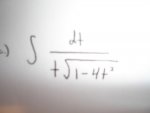Okay, I'm having a tough time with this problem, I really don't know where to start.
My main trouble is in getting the variable out of the denominator, I know it wil probobly be very obvious once I get help .
.
[attachment=0:1fpp5f1q]math.jpg[/attachment:1fpp5f1q]
My main trouble is in getting the variable out of the denominator, I know it wil probobly be very obvious once I get help
[attachment=0:1fpp5f1q]math.jpg[/attachment:1fpp5f1q]

